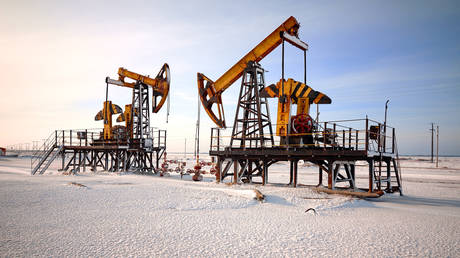
Economy minister warns that banning Russian energy could lead to a ‘severe’ economic crisis in Europe
German Economy Minister, Robert Habeck, has warned that a ban on oil and gas from Russia would lead to a severe crisis and urged Europe to focus on diversification of energy sources “at Tesla speed” instead.
Speaking on RTL/NTV on Tuesday, Habeck said that banning Russian gas and oil in Germany could lead to “permanently high” prices for fossil fuels. “We are then talking about a severe economic crisis in Germany and thus in Europe,” he said.
The minister said “some people don’t realize” the price that must be paid for sanctions against Russia. A survey conducted earlier this week showed that 54% of Germans would support the ban on Russian oil and gas imports.
Speaking at a press conference following a meeting with the energy ministers of the German federal states, Habeck admitted that dependence on Russia is “not a good situation,” and therefore should be tackled through the expansion of renewable energies. This should be done as “a national effort” and “at Tesla speed,” the minister said.
If Russian President Vladimir Putin cuts exports to Germany, Habeck said Berlin is “prepared,” will not let itself “be threatened” and that its oil and gas reserves would help it overcome the difficulty.
The Federation of German Industries has also warned against a ban on Russian energy, with its president, Siegfried Russwurm, saying an embargo “threatens to punish Germany and the EU more severely than the aggressor.”
On Monday, Russia’s deputy prime minister, Alexander Novak, said that banning Russian oil imports would lead to “catastrophic” consequences for the global markets. According to Novak, energy prices might rise to over $300 per barrel of oil. The remarks came after gas prices in Europe hit record highs of almost $3,900 per 1,000 cubic meters while the price of Brent crude oil surpassed $130 per barrel for the first time in a decade.
Novak also criticized Germany’s decision to freeze certification of the Nord Stream 2 gas pipeline project and stressed that Moscow has a “full right” to stop supplying gas via the Nord Stream 1 pipeline, which is not targeted by Western sanctions. Russia is not that dependent on the West and “knows where to reroute” its supplies if needed, Novak explained.
On Tuesday, the UK announced it would phase out Russian oil imports by the end of 2022, while the US also announced a ban on Russian oil imports in response to the ongoing conflict in Ukraine — a move that threatens to send global gas and oil prices even higher than the already record-setting costs.




